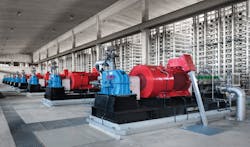| Spain does not currently comply with EU urban water treatment legislation |
The Spanish wastewater treatment market is facing a number of serious pressures, not least the need to finance remedies despite lacking universal, sustainable economic solutions. In a country afflicted by ongoing severe drought, the issues provide both significant challenges and opportunities.
Carlos Cosín Fernández, the chairman and CEO of one of Spain's major power and water utilities, Abengoa, explains that the country's wastewater sector faces several important and urgent environmental issues, including water scarcity and breaches of European regulations. It also has to tackle economic issues including a major investment gap and insufficient rates to recover the costs incurred in constructing wastewater treatment plants and making new investments.
He notes: "Many of the issues in Spain are the same as the issues that other developed countries face around the world, yet the droughts that Spain often faces exacerbate the situation."
It is necessary to improve the efficiency of the country's infrastructure and wastewater treatment plants, he adds, highlighting the need for legislation: "Creating a new legislative and regulatory framework would provide stability to the sector in order to attract the investments needed and, in parallel, would ensure that sewage treatment is efficient and environmentally sustainable in the long term."
In addition, he believes that there is also a need to create a "predictable and consistent economic framework for service delivery.
"Levels of investment in sewage treatment differ depending on the country. Spain, for example, has a lower level than the EU average."
To improve, the country must identify best practices that are being implemented outside its borders, he says, noting a need for more public education: "There is a lack of user awareness about the cost of water, both supply and treatment."
As in the rest of Europe, wastewater treatment policy in Spain is governed through EU Directive 91/271 (the Urban Wastewater Treatment Directive), and the EU Water Framework Directive. It is also covered by the Spanish hydrology planning system.
Fernández explains that the Environment Ministry (Magrama), confederations , municipalities, Water Agencies and other stakeholders are also governed by Royal Decree 01/2001 20 July (Spain's cornerstone ‘Water Law') and follow the Spanish Wastewater Plan 1995/2005 and the Spanish Water Quality law 2006/2015(2020).Wastewater connections
The Spanish Wastewater Plan has exerted a major positive influence, Fernández believes: "Thanks to the Spanish Wastewater Plan, the situation in the country has significantly improved, increasing the population connected to the sewage system from 40% to 80%. However water management in Spain is very decentralised and fragmented, often creating conflicts in regulation and a market that can be difficult for the private sector to navigate."
He adds: "Spain does not currently comply with EU urban water treatment legislation. Specifically, Spain is aiming to meet the objectives set by the WFD for wastewater treatment in municipalities with over 10,000 inhabitants - only 32% of Spanish municipalities over 10,000 population have the tertiary systems for wastewater treatment that are required by Community legislation."
This means there is a significant unmet demand for wastewater treatment, he observes. "Magrama anticipates a requirement for around 400 projects, representing an investment of €1000 million, to meet European requirements for water quality and environmental protection, under the Water Framework Directive and recommendations contained in the EU Water Blueprint."
Tariffs
There are other unique pressures upon Spanish utilities, not least a popular desire for a common methodology to calculate tariffs. "There is pressure to ensure uniformity in the criteria for calculating the rates throughout the country, and avoid possible comparative grievances between citizens and consumers. Creating a mandatory national methodology for calculation of tariffs is a necessary measure. In addition, there is a need for public education around the issue of water pricing."
The modernisation Spain needs, and which such partnerships could encourage, would have numerous benefits - for example, improving the efficiency of treatment plants would reduce energy and chemical consumption, he points out. "Many of the facilities are outdated and inefficient. The modernisation of infrastructure is therefore necessary, but will require heavy investments that the public sector is not in a position to undertake today."
Water cycle management
This is another reason why Spain should explore public-private partnerships, to help update and improve existing facilities and create new ones to optimise the complete water cycle, he adds.
Looking at the water cycle as a whole, introducing water reuse techniques in key sectors in the economy, notably agriculture and industry, is also important to Spain he notes, adding that the challenges will develop over time.
"Spain is a country with water shortages. In line with the requirements of the EU and sustainable development, reclamation and reuse of wastewater on a large scale in Spain is necessary. This would generate alternative resources primarily for agriculture and industry, allowing us to devote scarce natural resources for use in cities and as drinking water."
There is a need for greater awareness of Spain's unique challenges at a European level, he adds. "The water problems Spain is facing are different from those that the countries of northern Europe may have. It seems that this is not clear at the level of the European Commission. Many of the regulations and recommendations seem to be dictated by the needs of the countries in northern Europe and are not applicable to the Spanish situation and reality, he adds. Magrama's work has been to try to follow the instructions from Brussels but adapted as far as possible to the basic priorities and needs of Spain."
River basin leadership
Despite the country's acknowledged issues, it can also boast some important triumphs against adversity. Spain's unique situation means that other European countries can learn from its leadership in several fields, Cosín says. "Spain has always faced unpredictable, severe droughts, unlike other European countries. As a result, we have become leaders in the desalination market as well as river basin monitoring and management.




